Have you ever thought about how different booking a bus has become in just the last 10 years? There’s no standing in line, no endless phone calls with an agent who can’t confirm your seat. Instead, you tap twice, pick your route, and that’s it. Done in seconds. But here’s the catch: while the passenger’s world has gone digital, many operators behind the scenes are still juggling spreadsheets, delayed settlements, and too many disconnected tools.
Automation in bus ticketing systems is no longer a future concept. It is already at work, quietly streamlining everything from scheduling to reporting. And this change matters because it isn’t about replacing human roles. It is about giving teams time to think, plan, and grow instead of fighting daily chaos. The real story here isn’t digital convenience alone; it’s about business survival in an industry where efficiency and adaptability are now the true competitive currencies.
Explore how a powerful bus ticket booking system can help streamline your end-to-end ticketing operations.
Automation’s Next Stop in Travel
The travel industry has always been an early adopter of tech, but bus ticketing systems somehow lagged. You can call it legacy setups, fragmented ticketing chains, or maybe just inertia. Whatever the reason, things are finally changing fast.
Automated ticketing solutions have started addressing what most operators secretly dread: manual data entry, error-prone seat allocations, refund chaos, and operational blind spots. In simple terms, they replace repetition with reliability.
Yet, it’s not about robots replacing people. It’s about giving businesses control over time. Think of dispatchers who no longer need to reconcile trips manually every night or agents who can now manage 10 times the bookings without burnout. That’s real impact. So, yes, digital bus ticketing solutions are the quiet partners every operator needed but didn’t realize they could afford.
Learn more about how technology and AI are transforming the industry in our post on AI and predictive analytics in bus transportation planning.
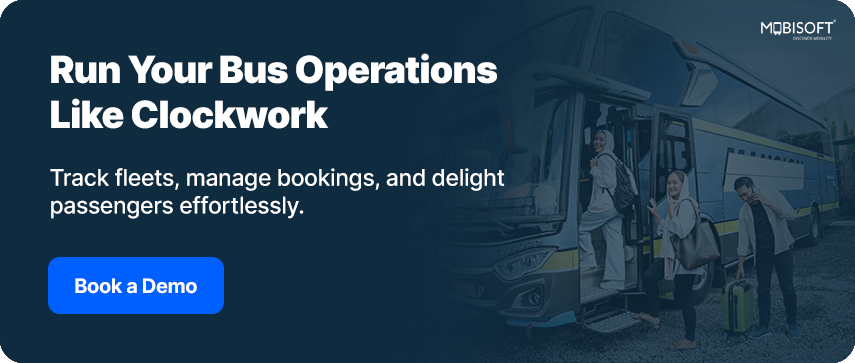
Why Bus Ticketing Has Become a Strategic Platform?
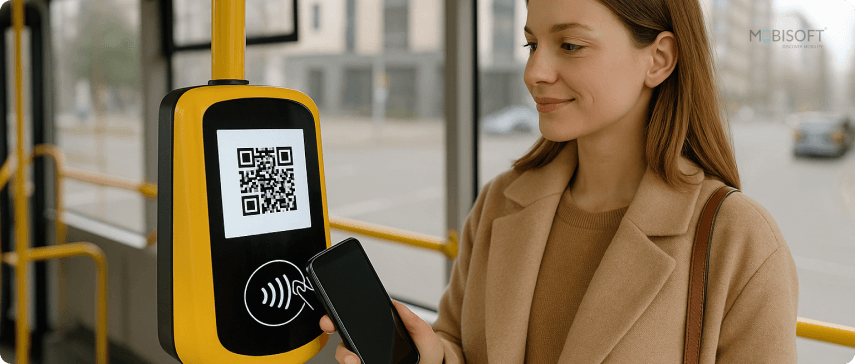
A usually overlooked truth is that bus ticketing system software has evolved from a backend tool to a business engine.
Bus operators used to view their bus ticketing software as an administrative system. Now it’s a goldmine of commercial data: passenger demand patterns, route profitability, cancellation trends, even the ideal price points during off-peak hours. The bus reservation system has evolved into a decision-making hub.
Automation allows all that data to sync in real time. Routes get optimized without manual tinkering. Promotions run automatically when occupancy dips below thresholds. And revenue managers finally get dashboards they can trust.
In B2B circles, the conversation has moved from “how to automate booking” to “how to build a strategy around booking.” That’s the mindset shift separating growth-ready operators from those still running yesterday’s playbook with limited bus ticketing system integration.
Discover the factors that matter most when selecting the right bus booking software for your operations.
Key Technologies Powering Modern Bus Ticketing
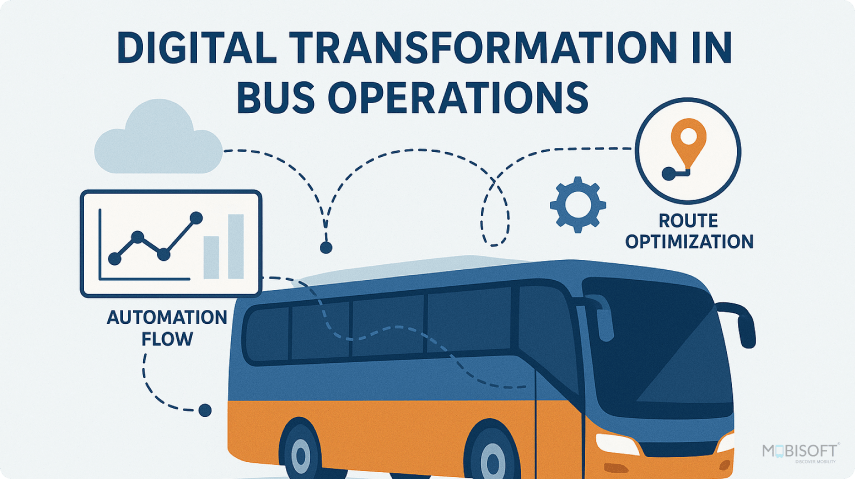
Behind every “book now” button lies a complicated dance of APIs, payment gateways, and analytics engines. Let’s break down modern bus ticketing system technology trends.
- They rely on modular architecture, such as booking engines that plug easily into payment systems, telematics, and CRM tools.
- Fleet telematics feeds live data on vehicle locations. AI scheduling tools predict delays or reroute buses automatically.
- Even the humble ticket printer is getting smart, syncing data directly to cloud dashboards.
- Next, consider the hidden framework: code that updates routes, interfaces that communicate with external APIs, and systems that adjust prices.
This creates a linked network where each component is aware of the others' actions. It’s complex, sure, but that’s what makes it scalable. Operators no longer need custom builds for every new route or city. They just expand through integration instead.
See how implementing an automated bus scheduling system can improve route efficiency and reduce operational delays.
Operational Automation: From Dispatch to Real-Time Monitoring
This is where automation in bus ticketing systems gets financial and interesting. Payment automation has turned what used to be a week-long reconciliation process into a near-instant settlement.
Schedules change, drivers call in sick, buses break down, and passengers cancel at the last minute. And somehow, everything needs to stay on track. Traditionally, this chaos was handled by phone calls and paper manifests. Now? Bus ticket reservation system automation does the heavy lifting.
Dispatch systems assign replacements automatically when a driver drops out. GPS data feeds into ETA adjustments in real time. Passengers get notified before they even realize there’s a delay. It’s the kind of behind-the-scenes precision that passengers don’t notice, but business owners absolutely do.
One operator I recently spoke with described it best: “We don’t worry about what’s next; the system already has.”
Automation has become the safety net that catches human errors before they turn into service failures. And the beauty of it? It learns. Each day, each trip, it gets smarter, delivering a smarter ticket booking system automation for buses.
Customer Experience and Conversion Through Automation
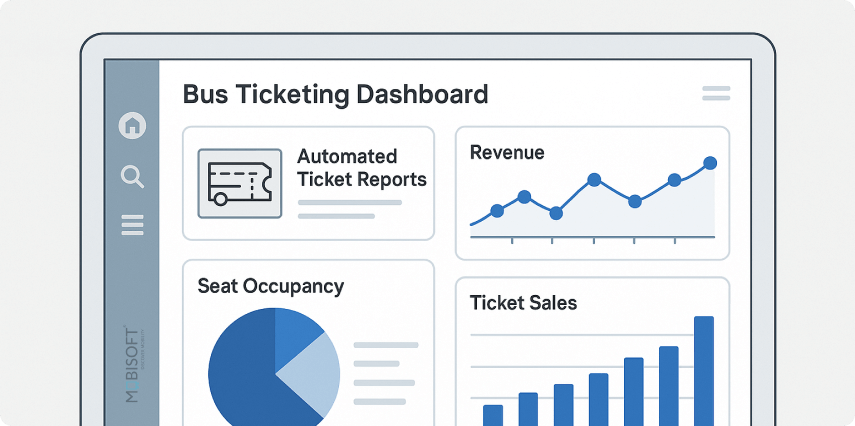
A great booking system is one that quietly makes customers come back.
Personalization
Automation now handles personalization in ways that feel effortless. Think seat recommendations based on past choices, one-click rescheduling, or even gentle reminders nudging users before fare increases. The entire funnel, from search to payment, gets shorter and smoother.
Trust Building
But automation also solves a deeper problem of building trust. When users see instant confirmation, consistent pricing, and fast refunds, confidence builds. And in a market crowded with aggregators and new travel apps, that trust is priceless. Contactless bus ticketing also adds a layer of safety and convenience that modern passengers expect.
Conversion optimization
Though it sounds like a marketer’s buzzword, it is where automation proves its worth daily. Abandoned carts drop when payment friction disappears. Loyalty grows when communication feels personal. None of this requires human micromanagement anymore; it’s the real benefits of bus ticketing system automation in action.
Discover how smart mobility and transportation management solutions enhance operational transparency and customer satisfaction.
Payments, Data, and Security in Automated Systems
This is where automation gets financial and interesting. Payment automation has turned what used to be a week-long reconciliation process into a near-instant settlement.
- With open payment frameworks and account-based ticketing, every transaction syncs directly with both operator and partner accounts. No double entries, no manual uploads.
- Fraud detection systems now flag duplicate bookings, suspicious refund patterns, and unauthorized agent activities in real time.
- The smarter systems allow operators to define who owns what data, how long it’s stored, and how it’s shared. That’s both good ethics as well as good business.
Because in a B2B contract, data control is often the silent deal breaker.
Choosing the Right Vendor or Platform
Choosing a vendor used to mean comparing price lists, which is not the case anymore.
What to Look for Beyond the Basics
Today's companies seek networks, not individual tools. The ideal bus ticketing system software should work well with your current setup. This includes vehicle monitoring, customer databases, financial tools, and payment gateways. Yet, adaptability is crucial when selecting automated ticketing solutions that fit your ecosystem.
Evaluating Support and Implementation
So how do you pick? Start with performance metrics: uptime, reporting accuracy, and API reliability. Then, dig into their implementation support. Ask how they handle edge cases, route expansions, or payment anomalies. A good vendor answers with specifics, not sales talk.
Understanding Pricing and Value
Pricing models also deserve scrutiny. Some online bus reservation systems take a cut per transaction, while others run on fixed SaaS fees. There’s no universal best, only what aligns with your cash flow and growth model. Comparing options among the best bus ticketing software can help identify long-term value and flexibility.
Pilot Before You Commit
Piloting is crucial. Run a limited-route test for 30 days. Measure booking speed, support response, and revenue accuracy. Then decide. Automation in ticket booking systems done wrong creates new problems; done right, it removes old ones.
The 90-Day Roadmap to Automation Readiness
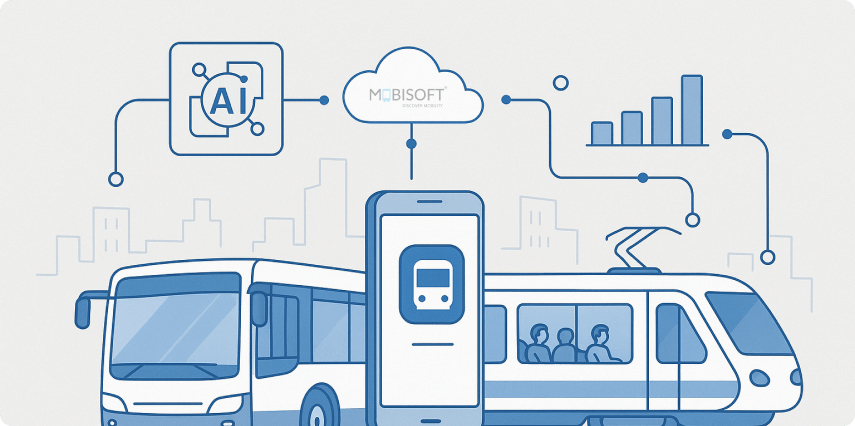
Automation sounds big and expensive until you break it down. A structured 90-day roadmap makes it achievable.
Phase 1: Audit (Weeks 1–3)
Evaluate your current bus reservation system. Identify manual choke points, such as refunds, reporting, and scheduling. Document what works and what doesn’t. The goal isn’t to replace everything but to pinpoint what truly needs automation.
Phase 2: Pilot (Weeks 4–8)
Pick one route or department. Implement ticket booking system automation for buses on a small scale, starting from driver assignment, payment reconciliation, or customer notifications. Measure time savings, staff response, and customer feedback. Adjust as needed to enhance bus ticketing system integration.
Phase 3: Scale (Weeks 9–12)
Every industry has a turning point where efficiency becomes brand identity. For bus operators, that time is now. Smart bus ticketing solutions can’t fix bad business plans or poor customer care, but they can improve practices. They allow trustworthy companies to grow quickly, provide reliable service, and make wiser choices.
This gradual approach avoids the classic “tech fatigue” many companies face. It builds internal confidence. This is because bus ticketing software automation isn’t just a product; it’s a mindset shift across your operations.
Turning Automation into a Competitive Edge
Every industry has a turning point where efficiency becomes brand identity. For bus operators, that time is now. Automation can't fix bad business plans or poor customer care. It can, however, improve practices. It allows trustworthy companies to grow quickly, provide reliable service, and make wiser choices.
Of course, technology on its own is never the solution. It magnifies what already exists. Strong processes get stronger; weak ones crumble faster. Automated ticketing solutions help good operators grow faster, deliver consistently, and better understand their customers. Those who resist change will see competitors move ahead with sharper tools and AI in bus ticketing systems for real-time analytics and route optimization.
This isn’t about machines taking over. It is about freeing people to focus on strategy, service, and partnerships. Here’s something worth thinking about: automation is no longer a differentiator. It’s the baseline. The real differentiator is how intelligently you use it.
This isn’t about machines taking over. It is about freeing people to focus on strategy, service, and partnerships. Here’s something worth thinking about: automation is no longer a differentiator; it’s the baseline. The real differentiator is how intelligently you use it through online bus booking software
Check out how online bus booking systems enhance passenger communication and real-time updates.
Key Takeaways
- Bus ticketing systems have evolved from background processes into strategic cores that drive revenue, insights, and smarter operational planning.
- Real-time data now powers everything. Route updates, pricing adjustments, and customer notifications make accuracy and speed the new norm
- Modern systems aren’t built from scratch anymore. Bus ticketing system integration boosts growth by connecting payments, telematics, and CRM tools into one live network.
- Automation’s quietest advantage is trust. Contactless bus ticketing with fast refunds, consistent fares, and instant confirmations turns casual riders into loyal customers.
- A structured roadmap audit, pilot, then scale makes bus ticketing automation practical, measurable, and easier to adopt without internal disruption.
The winning edge now lies in how intelligently operators use digital bus ticketing solutions, not whether they use them. It’s no longer an upgrade; it’s survival.

FAQs
What’s the biggest hurdle operators face before automating?
Oddly, it’s not cost, but hesitation. Many fear the unknown or assume their current system is “good enough.” However, once they test even one automated ticketing solution, such as driver dispatch or refund management, they usually wonder why they waited so long. The comfort of old routines often hides a bigger inefficiency.
Why is ticketing software now called a business engine?
Because it stopped being a passive tool. Every booking, cancellation, or route update produces usable insights. Over time, those patterns reveal how to adjust pricing, plan new routes, or refine marketing spend. Rather than recording sales, it’s about steering strategy with real data using the bus ticketing system software.
How can automation improve customer loyalty without adding more marketing noise?
By doing small, invisible things right, such as personalized seat suggestions, smooth refunds, and real-time notifications. Customers don’t remember the interface; they remember the ease. And when booking feels effortless with online bus reservation systems, trust builds naturally without flashy campaigns.
Are small and mid-sized operators ready for automation?
Yes, and in many ways, they’re better suited. Smaller teams adapt faster and can pilot systems in weeks instead of months. With modular bus ticketing software and online bus booking automation, even regional operators can now access enterprise-level features. The entry barrier has quietly disappeared.
What does “doing automation right” really mean?
It means knowing what not to automate. Some tasks still require a human touch, such as complaints, special requests, or partnership deals. Automation in bus ticketing systems should lighten the load, not erase judgment. The best systems blend logic and empathy, letting humans focus on what machines can’t yet understand.

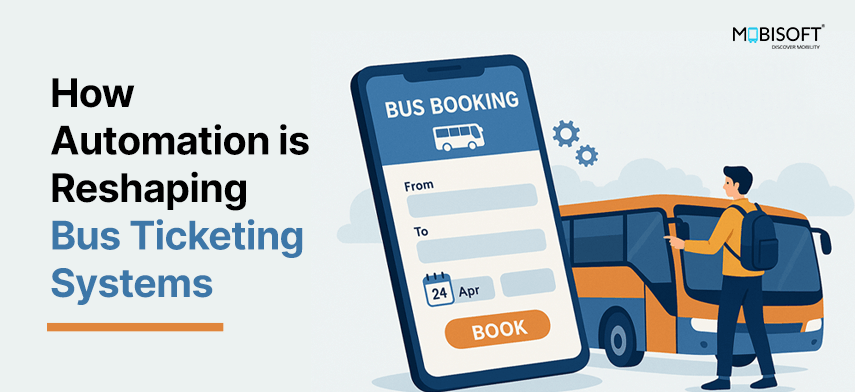


 October 6, 2025
October 6, 2025


